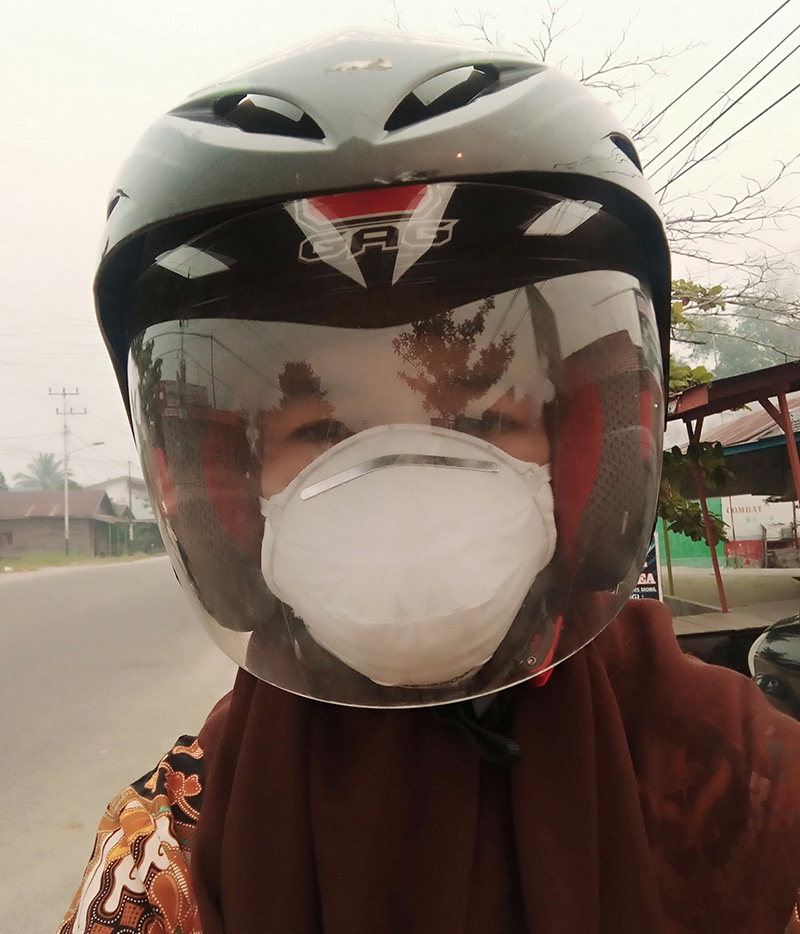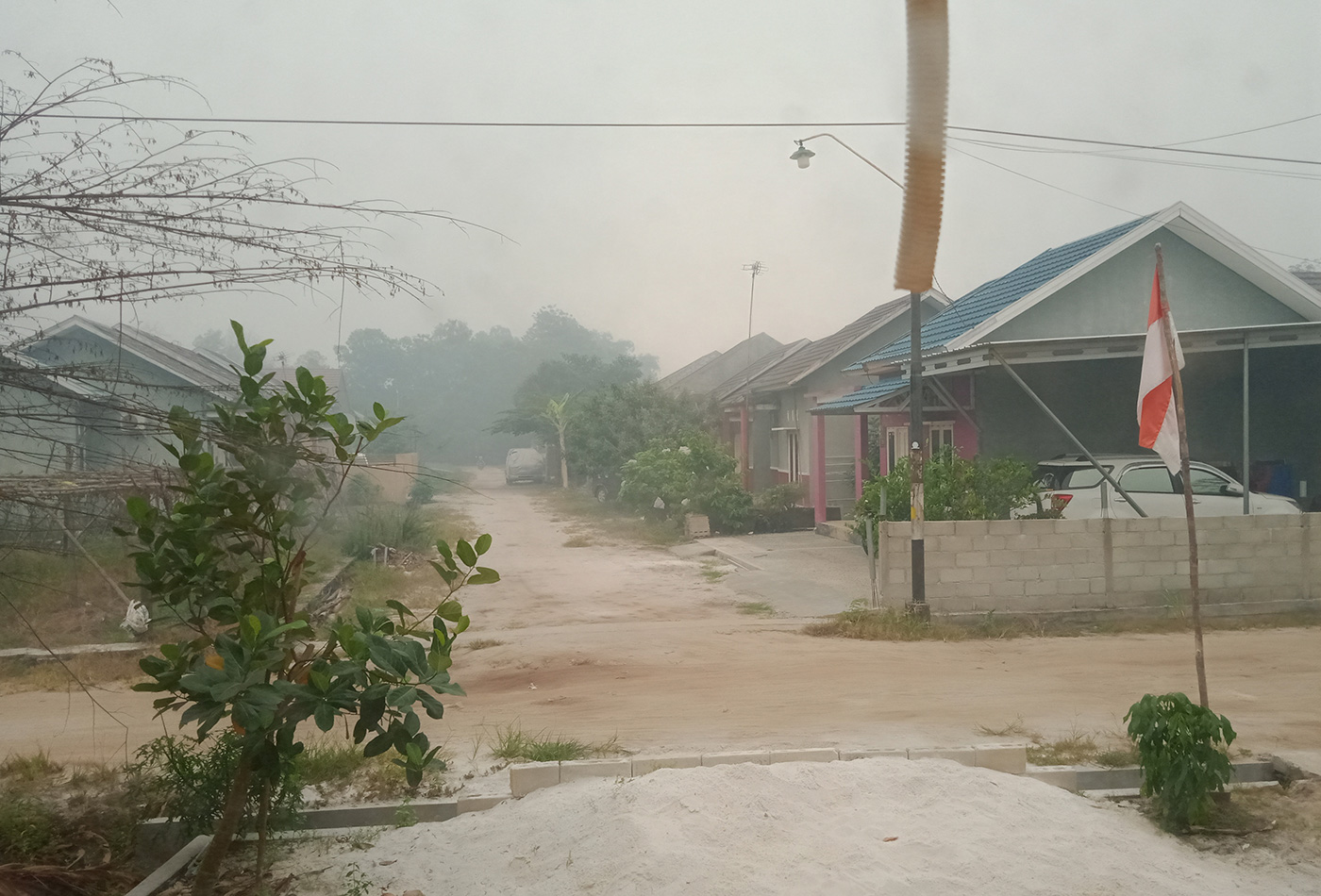
indonesia
When cutting air pollution becomes personal
As a high school student, Vovia Witni remembers being hospitalized for three days in 1997,when thick smoke from fires in Indonesia’s Riau Province island drifted 1,000 kilometres westwards over her city in West Sumatra province aggravating her asthma.
Today, Witni lives in Central Kalimantan. Here she works with local NGO Yayasan Tambuhak Sinta (YTS), which is striving to reduce all types of pollution, including the smoke caused by the forest fires that burn annually and in exceptionally dry years can blaze for weeks.
Between July and October, when the dry season begins, Witni starts to worry. This is when the fires usually peak as farmers across Indonesia, but particularly on the islands of Sumatra and Kalimantan, take advantage of the drier conditions to clear vegetation for crops. Nickolaus Hariojati of Pure Earth Indonesia says growers believe incorrectly that the ash created can substitute for fertilizer, so by burning fields they will save money.
National Interests: Central Kalimatan
The problem has been exacerbated in recent years as fires are used to clear large tracts of land for the lucrative oil palm industry and other mono - crops. Fires often get out of control and burn large swatches of land, pumping vast amounts of smoke containing fine particles into the air. This kind of air pollution is particularly dangerous as the fine particles can settle deep in people’s lungs, causing and aggravating serious health problems.
Health under fire
In Indonesia, the smoke pollution produced by forest and peatland fires (known locally as karhutla) has been a growing issue for decades, with the country seeing several devastating fire seasons in recent years.
In 2015, the government called a state of emergency across six provinces, including Kalimantan, closing schools and encouraging people to stay indoors as air pollution far exceeded safe levels. Then, in 2019, from her home, Witni could see smoke rising from the fires as Indonesia and even neighbouring countries were blanketed in a toxic haze for months. “My husband needed to buy an oxygen supply for my use at home,” she says via a Zoom call. “Luckily my condition didn’t worsen and I didn’t need to be hospitalized that time,” she says. As the intensity of these annual fires in Kalimantan increase, so too do the related health issues, according to the Institute for Health Metrics and Evaluation’s Global Burden of Disease project.
“My husband needed to buy an oxygen supply for my use at home. Luckily my condition didn’t worsen and I didn’t need to be hospitalized that time.” – Vovia Witni, Yayasan Tambuhak Sinta
They estimate that particulate air pollution in Kalimantan increased between 1990 and 2017, with the percentage of deaths caused by exposure to air particulates increasing from 0.7% to 2.5% of all deaths. This kind of air pollution is also increasing the rates of respiratory tract infections, as well as chronic lung disease and cancers, placing burdens on individuals, their families and the health system.
 |
|---|
| The view from the front yard of Witni's house during the forest and peatland fires in September 2019. |
Action on awareness
In January 2019, Witni’s NGO YTS and Pure Earth, which are members of the Global Alliance on Health and Pollution (GAHP) — developer of the Health Pollution Action Plan (HPAP) programme — approached the province’s Environment Agency (DLH) and Health Service Office about creating an HPAP for Central Kalimantan.
The HPAP programme aims to identify, prioritize and accelerate national interventions to reduce illness and death related to pollution that are directly related to broader development challenges such as economic loss, injustice and poverty. Witni played a major role in developing the Plan. When it was completed in 2020, she was happy to see that addressing air pollution from the local fires was targeted. “I hope that the output of the project can help the government better handle forest and peatland fires.”
Throughout its 10 years life, the action plan stresses increasing public awareness about the environmental and health impacts of smoke pollution. This includes developing material to educate children at elementary and secondary school levels about the impacts of the fires.
Asthma condition
Witni believes that raising people’s awareness about the dangers of smoke pollution is the key to widespread change, but it will take time and commitment. She says that now people react differently to the issue. While there have been some public protests demanding action in parts of the heavily affected areas, in her current home province most people don’t even bother to wear masks when the air is smoky. It’s not that people elsewhere are more educated, she stresses, but that maybe those in Central Kalimantan are more used to the burning.
“I hope that the output of the project can help the government better handle forest and peatland fires.” — Vovia Witni, Yayasan Tambuhak Sinta
A top priority for YTS and Pure Earth is seeing the plan incorporated into the regional work plans of the province, districts and cities. In 2021 that was achieved when the HPAP priorities were incorporated in Central Kalimantan’s mid - term development plan, says Hariojati. This is a critical step in making the goals of the plan a reality on the ground.
Signs of change
According to Hariojati, Central Kalimantan’s pollution issues are now reaching the national agenda, with members of the national and regional parliament discussing the fires and what to do during several sitting sessions.
Meanwhile, on the ground, Witni says she’s happy to see when she travels that some villages in the province are taking a more proactive approach to fire prevention. For example, the number of hotspots at the local level is now tracked to indicate the level of risk. If it rises too high the mayor will announce an emergency and a community response plan will be activated.
At the personal level she has also taken the initiative to teach her daughter, now in grade 2, what to do in case of a fire emergency. “Some people maybe don’t consider it as a big issue but for me I think I need to prepare my daughter for the worst case scenario.”
Pollution is silent
Witni believes that others should also be proactive. “Developing countries like Indonesia need to pay more attention to pollution issues. Sometimes people and governments do not consider pollution an issue because it is a silent disaster. Maybe today nothing will happen, but it can affect many lives in the future. I’m worried for the future generation, for all kinds of pollution. People should pay more attention to the environment.”